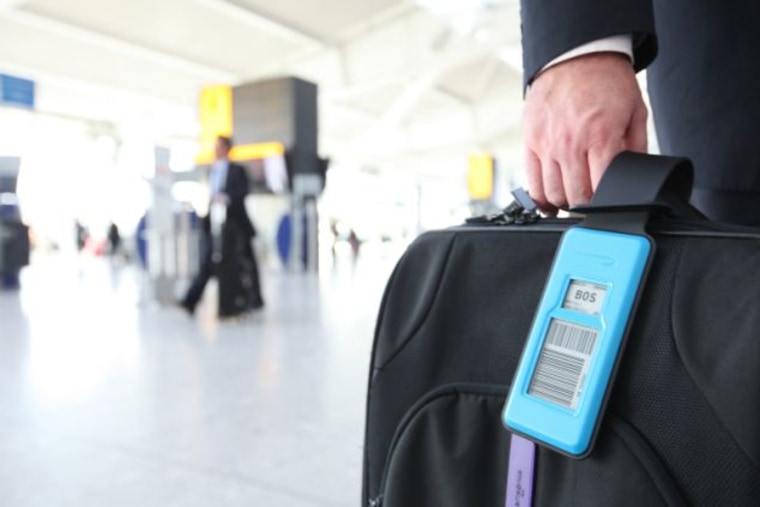A permanent digital luggage tag being tested by British Airways could help make temporary tags obsolete and speed up the check-in process.
The 2.95 billion adhesive luggage tags that airlines now print each year are enough to circle the Earth 39 times, according to the International Air Transport Association. "And they're not just made of paper, but a silicon derivative that's very hard to recycle," said Andrew Price, IATA's head of baggage services.
British Airway's digital tag would allow travelers to use the same ID on each journey.
(Read more: These airlines allow electronic devices)
Here's how it works: Using the airline's mobile app, travelers can check in for a flight and hold their smartphones over a personalized digital tag to program it with flight details and baggage destination information. The tag uses Near Field Communication (NFC,) a short-range low-power wireless technology to transfer the information and long-lasting Kindle-like electronic ink to keep the unique barcode displayed and readable by baggage handlers and machine readers.
At the airport, the traveler can bypass the kiosk that prints tags and leave the electronically tagged luggage at a luggage drop or with a service rep at a counter. When it's time for a new trip, the information on the tag is reprogrammed.
During the recent month-long test of the digital tags on British Airways flights between Seattle and London, "all bags went where they needed to go," said Glenn Morgan, the airline's head of service transformation. He declared that digital tag a success, but said the next step is expanding the type of smartphones that can program them. "Right now only Android and Windows phones support NFC," said Morgan, and the airline wants to make sure the tags work fully with Apple phones as well.
British Airways may roll out a more sophisticated version of the digital tag for use by passengers in early 2014, but Morgan said the airline hasn't decided whether it will give the tag to its frequent fliers and/or offer it for sale at a price yet to be determined.
(Read more: Airports fight TSA on exit-lane staffing)
British Airways isn't the only company working on a digital bag tag.
In 2011, Australian airline Qantas Airways introduced its QBag Tag.The permanent electronic tag can currently be used only on the airline's domestic routes (with some exceptions) and relies on radio-frequency identification (RFID) rather than near-field communication to encode flight details onto the tag. Frequent fliers get a Q Bag Tag for free; others can purchase a tag for cash (about US $28) or for 6,500 Qantas points.
In April, IATA put together an industry working group to create standards for a permanent bag tag "that can be used in an interline environment and on any airline, regardless of the issuer of the tag."
And at the Paris Air Show in June, aircraft manufacturing company Airbus showed off a prototype of Bag2Go, a digitally enabled suitcase developed with the IT services and consulting company T-Systems and luggage manufacturer Rimowa. The bag not only incorporates electronic tagging but also a scale to weigh its contents and GPS for real-time tracking.
"Convenience and speed is the key for frequent travelers," said Richard Warther, president and CEO of Vanguard ID Systems, a Pennsylvania-based company that makes digital luggage tags. Security is built into the design so "electronic bag tags are now as good as the digital passports that are scanned when you get to customs," said Warther.
Morgan agreed on the safety. "The digital bag tag contains the same information as a paper tag so there are no security risks," he said.
(Read more: Texting while flying may be an option soon)
And while the home-printed bag tag is becoming more popular, IATA's Price doesn't think anything will totally replace the thermal adhesive-paper tags travelers have become so familiar with.
"But," he said, "I expect you may begin to see airlines using the digital tags within a year."
— By Harriet Baskas, special to CNBC.com. Baskas is the author of seven books, including "Hidden Treasures: What Museums Can't or Won't Show You," and the Stuck at the Airport blog. Follow her on Twitter at @hbaskas.
